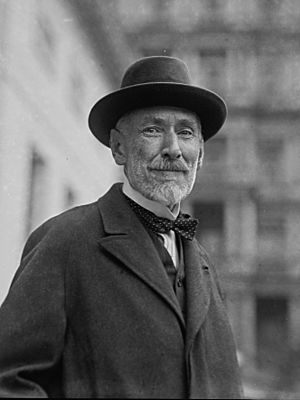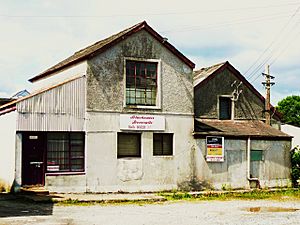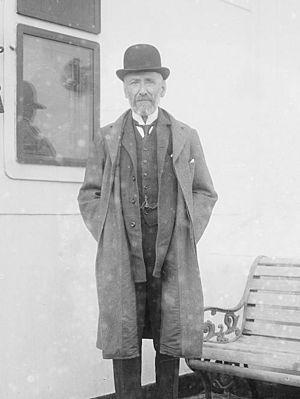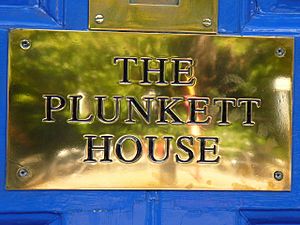Horace Plunkett facts for kids
Quick facts for kids
Sir Horace Plunkett
|
|
|---|---|
 |
|
| Congested Districts Board for Ireland | |
| In office 1891–1918 |
|
| MP for South Dublin | |
| In office 1892–1900 |
|
| Preceded by | Sir Thomas Esmonde |
| Succeeded by | John Joseph Mooney |
| Seanad Éireann | |
| In office 1922–1923 |
|
| Irish Convention | |
| In office 1917–1918 |
|
| Leader of the Irish Dominion League | |
| In office 1919–1921 |
|
| Personal details | |
| Born | 24 October 1854 Sherborne, Gloucestershire, England |
| Died | 26 March 1932 (aged 77) Weybridge, Surrey, England |
| Political party |
|
| Education | Eton College |
| Alma mater | University College, Oxford |
Sir Horace Curzon Plunkett (born October 24, 1854 – died March 26, 1932) was an important figure in Irish history. He was an Anglo-Irish person who worked to improve farming and rural life in Ireland. He is best known for starting agricultural cooperatives, where farmers worked together to get better prices and improve their products.
Plunkett was a MP (a type of politician) for South Dublin. He also supported Home Rule, which meant Ireland governing itself. Later, he became an Irish Senator in the new Irish Free State. He wrote books and was seen as a Christian socialist, meaning he believed in helping people through shared effort.
Contents
Early Life and Background
Horace Plunkett was born in Sherborne, Gloucestershire, England. He was the third son of Edward Plunkett, the 16th Baron of Dunsany. His family lived at Dunsany Castle in County Meath, Ireland.
He grew up in County Meath and was part of the Anglo-Irish Unionist community. This group wanted Ireland to remain part of the United Kingdom. He went to Eton College and University College, Oxford for his education.
In 1879, Plunkett had lung problems. He moved to Wyoming in the United States for ten years to improve his health. There, he worked on ranches and gained a lot of experience in farming and business. This experience was very useful when he returned to Ireland.
Horace Plunkett never married. He put all his energy into improving farming, helping rural communities, and working in politics. His main achievements include the Irish cooperative movement, which led to big food companies like Kerry Group. He also helped create what is now Ireland's Department of Agriculture, Food and the Marine.
Working for Ireland
Improving Rural Life
Plunkett wanted to bring people together, no matter their political views. His goal was to make Ireland more prosperous. In 1891, he joined the Congested Districts Board for Ireland. This board helped poor people in rural areas, especially in the west of Ireland.
He saw that many people in the countryside were struggling. He believed that working together through cooperatives was the best way to solve these problems. He had learned about cooperatives in America and from the Rochdale principles in England.
Agricultural Cooperatives
Plunkett played a big part in starting agricultural cooperatives in Ireland. He saw how farmers in other countries were working together. He encouraged Irish dairy farmers to form their first cooperative in Doneraile, County Cork. He also opened the first creamery (a place where milk is processed) in Dromcollogher, County Limerick. This is now a museum.
The cooperative movement was very successful with creameries. Farmers joined together to process and sell their own butter, milk, and cheese. This meant they could sell high-quality products to the British market. It also allowed farmers to deal directly with their own companies, getting fair prices without middlemen taking profits.
Plunkett had a slogan: "Better farming, better business, better living." He believed that farming needed its own revolution, just like industry had the Industrial Revolution. Even US President Theodore Roosevelt used his slogan for his own policies.
Growing Success and Challenges
At first, some people were not sure about the cooperative movement. Shopkeepers and butter-buyers even opposed it, saying it would ruin the dairy industry. But many farmers benefited, and the movement grew. Plunkett and his team, including the writer George William Russell, worked hard to spread their ideas.
In 1894, the movement became too big for a few people to manage. So, Plunkett founded the Irish Agricultural Organisation Society (IAOS). This society helped farmers set up more dairy cooperatives and cooperative banks. They also started a journal called The Irish Homestead to share farming information.
Within a decade, there were 800 cooperative societies with many members. Plunkett's work was challenging, but he had a long-term vision for rural Ireland. He believed that even if Ireland gained self-governance, rural areas would still need development.
Political Work
Plunkett was a Unionist, meaning he wanted Ireland to stay part of the United Kingdom. He was elected as an Irish Unionist Alliance MP for South Dublin in 1892. He worried that Home Rule (self-governance for Ireland) might lead to problems like civil war.
He lost his seat in 1900 because some hardline Unionists did not like his friendly approach to nationalists. This split the Unionist vote.
Even after losing his seat, Plunkett continued to work for Ireland. In 1895, he suggested that people from different political views should work together. This led to the formation of the Recess Committee, which Plunkett chaired. This committee studied how other countries supported farming and technical education.
Their report led to the creation of the Department of Agriculture and Technical Instruction (DATI) for Ireland in 1899. Plunkett became its vice-president, which meant he was in charge of its daily operations.
The DATI worked to:
- Improve crops and livestock.
- Deal with animal and plant diseases.
- Encourage fishing and planting trees.
- Collect important information about Irish life.
By 1914, the DATI had many instructors teaching farmers new methods. Plunkett's achievements peaked around the start of the 20th century. The IAOS was thriving, with hundreds of cooperative societies.
Later Challenges
Plunkett's book, Ireland in the New Century (1904), caused some problems. In it, he suggested that economics was more important than politics for Ireland's future. This upset some nationalist leaders who believed Home Rule was the only answer.
Eventually, the DATI stopped working well with the IAOS. The Irish Parliamentary Party tried to remove Plunkett from office. In 1907, he retired from the DATI. The new vice-president even stopped the annual grant to the IAOS. However, many people continued to be inspired by Plunkett's vision.
In 1908, people showed their appreciation for Plunkett by buying a building in Dublin for him. This became the headquarters of the IAOS and was named The Plunkett House.
Plunkett also helped found the United Irishwomen in 1910. This group aimed to improve the lives of women in rural Ireland. It later became the Irish Countrywomen's Association and inspired similar groups in the UK.
Political Changes and Later Years
Plunkett began to focus more on political issues. By 1912, he believed in Home Rule for Ireland. During World War I, he tried to prevent the partition (division) of Ireland. After the Easter Rising in 1916, he asked for mercy for the leaders who were still alive.
From 1917 to 1918, Plunkett led the Irish Convention. This group tried to find an agreement on how Home Rule would work. Until 1922, Plunkett worked to keep Ireland united within the British Commonwealth. He started the Irish Dominion League and a journal called the Irish Statesman to promote this idea.
In 1922, after the Anglo-Irish Treaty was signed, Plunkett was chosen to be a member of the first Seanad Éireann. This was the upper house of parliament in the new Irish state.
While he was in the United States in 1923, his home in Foxrock, County Dublin, was burned down during the Irish Civil War. Many of his family records were lost in the fire. He was very sad about this and resigned from the Seanad later that year.
Plunkett moved to Weybridge, England. In 1918, he had set up the Sir Horace Plunkett Foundation, which is now the charitable Plunkett Foundation. This foundation continues to support cooperative movements and community groups today.
He kept promoting his ideas for agricultural cooperatives. He even advised the Prime Minister of Great Britain on farming policy in 1930. Horace Plunkett died in Weybridge on March 26, 1932, and was buried in Byfleet.
Writings
Horace Plunkett wrote several books and many pamphlets about his ideas, including:
- Ireland in the New Century (1904)
- Noblesse Oblige: An Irish Rendering (1908)
- The Rural Life Problem of the United States (1910)
Images for kids
 | Stephanie Wilson |
 | Charles Bolden |
 | Ronald McNair |
 | Frederick D. Gregory |





